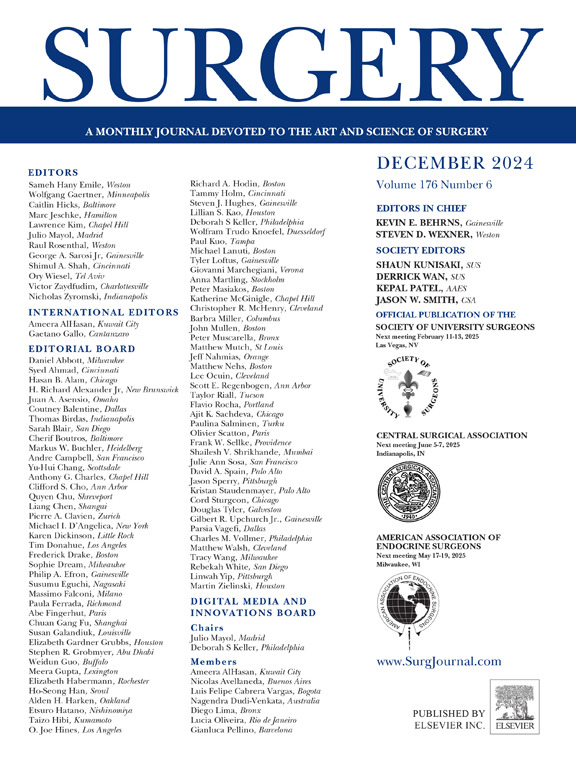美国择期癌症切除的急性预后与社会心理风险因素的关系
IF 3.2
2区 医学
Q1 SURGERY
引用次数: 0
摘要
心理社会风险因素,包括精神障碍、药物使用、有限的认知理解、低社会经济或无保险状况,在癌症治疗中越来越被认识到。然而,它们对选择性癌症手术后急性术后结局的独立影响尚不清楚。本研究评估了接受癌症切除术的患者的社会心理风险因素与临床和财务结果之间的关系。方法从2016-2021年全国再入院数据库中列出所有需要择期切除肺癌、食管癌、胃癌、胰腺癌、肝癌和结肠癌的成人(≥18岁)记录。在熵平衡之后,我们建立了多变量回归模型来确定心理社会危险因素的独立关联。死亡率,并发症,住院时间和非家庭出院。结果在655,376例患者中,223,035例(34.2%)被认为包含社会心理风险因素。与其他人群相比,心理社会风险因素队列中女性更为常见(51.9 vs 47.1%, P <;.001),且Elixhauser合并症指数更高(4 [3 - 5]vs 3 [2-4], P <;措施)。两组最常行结肠切除术(51.9% vs 51.1%, P <;.001),但有社会心理危险因素者的肺叶切除率更高(27.8% vs 25.8%, P <;.001)。经过熵平衡后,心理社会风险因素与更高的死亡率(校正优势比为1.43,95%可信区间为1.31-1.57)、呼吸(校正优势比为1.25;95%可信区间,1.21-1.31)和传染性(校正优势比,1.17;95%可信区间,1.12-1.21)并发症。此外,具有社会心理风险因素的患者面临着逐渐增加的资源使用。结论心理社会风险因素独立预测选择性癌症手术后的不良临床和财务结果。对社会心理危险因素的系统筛查可能有助于有针对性的干预措施,以改善对高危患者的护理。本文章由计算机程序翻译,如有差异,请以英文原文为准。

Association of psychosocial risk factors with acute outcomes of elective cancer resection in the United States
Background
Psychosocial risk factors, including psychiatric disorders, substance use, limited cognitive comprehension, and low socioeconomic or uninsured status, are increasingly recognized in cancer care. However, their independent effects on acute postoperative outcomes after elective cancer surgery remain unclear. This study evaluates the association between psychosocial risk factors and clinical and financial outcomes in patients undergoing cancer resections.
Methods
All adult (≥18 years) records entailing elective resection for lung, esophageal, gastric, pancreatic, hepatic, and colon cancer were tabulated from the 2016–2021 Nationwide Readmissions Database. After entropy balancing, multivariable regression models were developed to ascertain the independent association of psychosocial risk factors. with mortality, complications, length of stay, and nonhome discharge.
Results
Of ∼655,376 patients, 223,035 (34.2%) were considered to comprise psychosocial risk factors. Relative to others, the psychosocial risk factors cohort was more commonly female (51.9 vs 47.1%, P < .001), and had a greater Elixhauser Comorbidity Index (4 [3–5] vs 3 [2–4], P < .001). Both groups most frequently underwent resection for colectomy (51.9% vs 51.1%%, P < .001), yet those with psychosocial risk factors had greater rates of lobectomy (27.8% vs 25.8%, P < .001), compared with their counterparts. After entropy balancing, psychosocial risk factors were linked to greater odds of mortality (adjusted odds ratio, 1.43, 95% confidence interval, 1.31–1.57), respiratory (adjusted odds ratio, 1.25; 95% confidence interval, 1.21–1.31) and infectious (adjusted odds ratio, 1.17; 95% confidence interval, 1.12–1.21) complications. Furthermore, patients with psychosocial risk factors faced incrementally increased resource use.
Conclusion
Psychosocial risk factors independently predict adverse clinical and financial outcomes after elective cancer operations. Systematic screening for psychosocial risk factors may facilitate targeted interventions to improve care for high-risk patients.
求助全文
通过发布文献求助,成功后即可免费获取论文全文。
去求助
来源期刊

Surgery
医学-外科
CiteScore
5.40
自引率
5.30%
发文量
687
审稿时长
64 days
期刊介绍:
For 66 years, Surgery has published practical, authoritative information about procedures, clinical advances, and major trends shaping general surgery. Each issue features original scientific contributions and clinical reports. Peer-reviewed articles cover topics in oncology, trauma, gastrointestinal, vascular, and transplantation surgery. The journal also publishes papers from the meetings of its sponsoring societies, the Society of University Surgeons, the Central Surgical Association, and the American Association of Endocrine Surgeons.
 求助内容:
求助内容: 应助结果提醒方式:
应助结果提醒方式:


